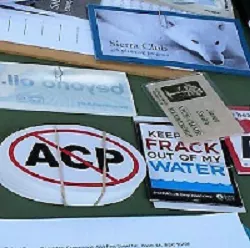Forty years ago, a group of North Carolinians kicked off a new chapter in environmental activism. They didn't plan to create a movement; they just wanted to protect their families and their community from an industrial polluter. But the threat they faced was far more common than many people realized, then and now.
"Environmental justice" may be a new phrase for some of us. It's been a long time coming, but environmental justice is increasingly a priority for people who are tired of their communities being "first and worst" when it comes to waste dumps, toxic emissions into air and water, and other human-made pollutants.
Many new environmental justice groups have formed since Warren County residents joined hands to fight a toxic waste dump, and longstanding groups like the N.C. Sierra Club are increasingly adding their support.
Even the U.S. Environmental Protection Agency, now headed by a native North Carolinian, has made environmental justice a priority. The agency is in the midst of studying how cumulative impacts of environmental threats build in certain communities.
What are cumulative impacts? The term describes the way racist practices pile onto low-income families and communities made up of Black, brown and other people of color, leading to a disproportionate level of environmental menace.
Those factors include racism in the form of redlining – a long-standing financial practice that segregated minority populations into less-desirable neighborhoods. The neighborhoods of socially marginalized people then become easy targets for polluting industries, chemical waste, landfills, and noisy, emission-spawning highways.
The N.C. Department of Environmental Quality (DEQ) is also taking notice of the impact on our state's people: Its Environmental Justice and Equity Advisory Board has a subcommittee on cumulative impacts that presented a study on how cumulative impacts have affected Robeson County.
That includes neighbors of industrial animal farms (concentrated animal feeding operations, or CAFOs) who endure foul odors and water and air pollution from animal waste runoff and aerial sprays.
But it's not just CAFOs. The same communities may also face pollution from nearby highways, wood pellet manufacturing, paper mills, fracked gas infrastructure, and more.

These communities are fighting back. In 2019, members of the Lumbee Tribe joined the fight against the Atlantic Coast Pipeline, arguing successfully that the fracked gas pipeline would threaten their communities during construction and operation with potential leaks, emissions and the risk of explosions.
Decision-makers must hear from community members and truly consider cumulative impacts when determining whether to issue permits for potentially-harmful industries. In our state, that input has been recognized via DEQ's Environmental Justice and Equity Advisory Board, and by establishment of Environmental Justice Leads for each Cabinet agency in Gov. Roy Cooper’s Executive Order 246.
DEQ defines cumulative impacts as “environmental impacts resulting from incremental effects of an activity when added to other past, present, and reasonably foreseeable future activities regardless of what entities undertaken such other actions.”
However, the agency is still grappling with exactly what that means for North Carolinians and how it should consider cumulative impacts when reviewing permit applications for polluting industries.
Several other states, such as New York, California, and New Jersey, also are working to ensure that cumulative health and environmental impacts are considered during siting and permitting for industrial operations. New York and California are among a group of states considering legislation to ensure that cumulative impacts are addressed in environmental assessments and programming.
North Carolina has taken admirable steps to elevate attention and action on environmental justice. Still, there's more to be done - and Sierrans can help make sure that happens.
Though environmental threats affect all of us, the threat isn't equal, and "cumulative impacts" continue to be piled onto North Carolinians who have the least resources to fight back.
That's why it's imperative that groups like the N.C. Sierra Club - with its long-established reputation, influence and relationships - uplift and support our neighbors and communities who for too long have been "first and worst" affected by environmental dangers.